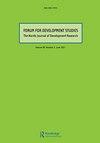丹麦发展政策的范式转换(1990-2020)
IF 1.1
Q3 DEVELOPMENT STUDIES
引用次数: 0
摘要
几十年来,丹麦发展政策的特点是连续性,并得到了整个政治领域相对稳定的共识的支持。然而,这种情况在新的千年中发生了变化,丹麦的发展政策发生了范式转变。本文描述并解释了这种范式转变,并确定了其主要驱动力。根据彼得·霍尔的政策范式框架,我将发展政策的变化确定为第一、第二和第三阶变化,这构成了根本性的范式转变。援助几乎减少了三分之一,各项文书的组成也发生了变化,减少了对双边国别方案的拨款,减少了对最贫穷和最稳定国家的拨款,增加了对人道主义援助和移民原籍地区的拨款。其他目的,例如安全关切、减缓全球气候变化或减少移徙流动,在很大程度上取代了长期以来减少贫穷的主要目标。国际事件和趋势当然是解释这些重大发展政策转变的重要因素,但国内的驱动因素同样重要,主要是由政策领域的先前转变所促成的发展援助的政治化,两者都是由国内联盟政治驱动的。这种政治化发生在2001年中右翼政府当选时,并实现了本世纪初的范式转变,自2019年以来,社会民主党少数派政府巩固了这种转变。本文章由计算机程序翻译,如有差异,请以英文原文为准。
The Paradigm Shift of Danish Development Policy (1990–2020)
Abstract
For decades, Danish Development Policy was characterized by continuity, backed, as it was, by a relatively stable consensus across the political spectrum. However, this changed in the new Millennium where a paradigm shift in Danish development policy took place. This article characterizes and explains the paradigm shift and identifies its main driving forces. Drawing on Peter Hall’s policy paradigm framework, I identify development policy changes as a first, second, as well as a third order change, which constitutes a fundamental paradigm shift. Aid has been cut by almost a third, and the composition of instruments has changed with reduced allocations to bilateral country programmes, reduced allocations to the poorest and most stable countries, and increased allocations to humanitarian aid and areas of origin of migrants. Other purposes such as e.g. security concerns, global climate mitigation, or reducing migration flows, have to a large extent substituted the longstanding main objective of poverty reduction. International events and tendencies are of course important factors in explaining these significant development policy shifts, but domestic driving forces are equally important and consist mainly in a politicization of development aid enabled by a prior shift in policy-arena, both driven by domestic coalition politics. The politicization happened when a centre-right government was elected in 2001 and enabled a paradigm shift that happened over the 00s and which has been consolidated by the Social democratic minority government since 2019.
求助全文
通过发布文献求助,成功后即可免费获取论文全文。
去求助
来源期刊

FORUM FOR DEVELOPMENT STUDIES
DEVELOPMENT STUDIES-
CiteScore
1.80
自引率
14.30%
发文量
24
期刊介绍:
Forum for Development Studies was established in 1974, and soon became the leading Norwegian journal for development research. While this position has been consolidated, Forum has gradually become an international journal, with its main constituency in the Nordic countries. The journal is owned by the Norwegian Institute of International Affairs (NUPI) and the Norwegian Association for Development Research. Forum aims to be a platform for development research broadly defined – including the social sciences, economics, history and law. All articles are double-blind peer-reviewed. In order to maintain the journal as a meeting place for different disciplines, we encourage authors to communicate across disciplinary boundaries. Contributions that limit the use of exclusive terminology and frame the questions explored in ways that are accessible to the whole range of the Journal''s readership will be given priority.
 求助内容:
求助内容: 应助结果提醒方式:
应助结果提醒方式:


